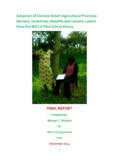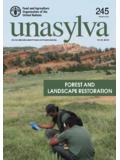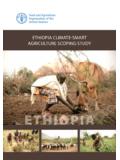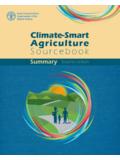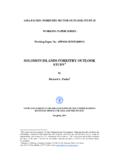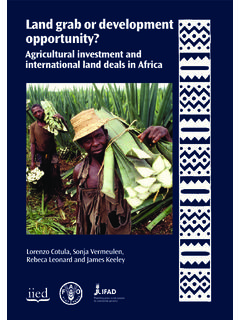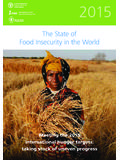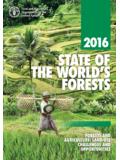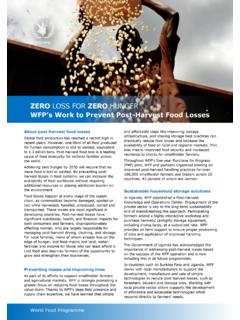Transcription of Agroecology for Sustainable Agriculture in …
1 52 Profiles on Agroecology : Agroecology for Sustainable Agriculture in trinidad : Rocrops Agrotec - an innovative model Case study provided by Ramgopaul Roop, owner of Rocrops farm Contact: Agroecology for Sustainable Agriculture in trinidad : Rocrops Agrotec an innovative model Introduction Rocrops is a smallholder farm established in 1990 in trinidad . It is owned and managed by the husband and wife team of Ramgopaul and Beena Roop. Sustainable succession planning has been an integral part of the management. In 1985, it was inherited from their parents Poyah and Roop Bataw and in 2014 it was legally transferred to their son, Sunil and daughter-in-law, Sally, both with tertiary level education.
2 In 2001 the family won the trinidad and Tobago Agricultural Entrepreneur of the Year. In addition, the farm received several other recognitions and awards. As part of his professional development, Ramgopaul Roop, at age 69, recently graduated (2016) with a Master of Business Administration (MBA) (Distinction) from Edinburgh Napier University, Scotland. The MBA dissertation was focused on Agriculture and outlined: A critical assessment of implementing lean management concepts in the post-harvest operations of the cassava industry in trinidad , West Indies. Additionally, he is a graduate in Agriculture (Eastern Caribbean Institute of Agriculture and Forestry, ECIAF, 1971) with over 45 years experience in Agriculture as an agricultural entrepreneur, agricultural officer and consultant in Sustainable Agriculture , soil and water management and practitioner in ecological cropping.
3 A prerequisite to implement Agroecology on farm is land tenure and compliance with the necessary regulations, as well as sound business management concepts. The Rocrops farm is comprised of ha. (3ac) of former degraded and acidic ( ) sugar cane lands with a 30 year standard agricultural lease from the state and an option to renew for another 30 years upon expiry in 2042. The development of the farm has emphasized a holistic approach which included compliance with the regulatory requirements on preservation of the environment through agroecological practices, farm family growth, professional development and Sustainable succession planning.
4 With adequate land tenure, the farm development included construction of a family dwelling house, storage and postharvest building, water storage pond, a micro-irrigation system and internal access road for ease of operation. The farm has been the family home providing a year round source of income for the past 30 years. Figure 1. Mr and Mrs Ramgopaul and Beena Roop Figure 2. Land condition in 1990, heavy clay soil with pH= Profiles on Agroecology : Agroecology for Sustainable Agriculture in trinidad : Rocrops Agrotec - an innovative model Description of the Agroecology system The farm s development has revolved around an integrated system of Agroecology practices to rehabilitate degraded heavy clay soils for horticultural and agricultural production, with minimum external inputs in an economically sound and environmentally friendly manner.
5 The goal is to promote Sustainable agricultural techniques and practices with the potential to contribute to rural development and food security of trinidad and Tobago. During the period 1990 - 2016, Rocrops has been an innovator in adopting appropriate technology for crop production on heavy clay soils in Central trinidad . Rocrops has, through a combination of strategic planning and farm management, been able to transform this former degraded sugar cane lands, acidic and low fertility clay soils to produce a wide range of vegetables, herbs and spices, citrus (limes) as the main crop and exotic tropical fruit crops.
6 Documented procedures include soil amelioration using limestone and tillage, micro irrigation and recycling of water, fertigation and precision fertilizer application. The conservation farming methods include water harvesting and growing lemon grass as mulch. Since the grass is also a weed, it discourages the growth of other harmful weeds without the use of herbicides. When it is hot the natural mulch helps to keep the ground cool and moist and when it is raining, it helps to reduce soil erosion. The objective is to produce high quality pesticide-free agricultural products throughout the year. This has been achieved by employing a combination of Integrated Crop Management (ICM) and Integrated Pest Management (IPM).
7 It involves soil and water harvesting and testing, field sanitation and special attention to post harvest handling techniques. It creates an awareness of the beneficial effect of using agricultural products with low level of chemical toxicity. Additionally, the cultivation of trees such as Caribbean pine, cedar, bougainvillea, decorative bamboo and neem as a live fence around the periphery serve as windbreaks and help in creating an agroecological and aesthetically pleasing environment. Political space The initiatives of Rocrops Agrotec in soil management and micro irrigation on heavy clay soils and integrated Sustainable Agriculture are being supported by the Ministry of Food Production, Land and Marine Resources, the Caribbean Agri-business Association (CABA), the trinidad and Tobago Agribusiness Association (TTABA), The University of the West Indies (UWI) and the University of trinidad and Tobago (UTT).
8 Restoring and maintaining soil fertility is a vital prerequisite for increasing output, especially given the current food crisis. The efforts of Rocrops Agrotec are being used as an Innovative Model by these organizations to mitigate against the constraints of land and water management in developing the agricultural sector in trinidad and Tobago from in GDP to 3% GDP in five years. These constraints include: Figure 3. Rocrops integrated cropping 52 Profiles on Agroecology : Agroecology for Sustainable Agriculture in trinidad : Rocrops Agrotec - an innovative model Heavy clay soils occupy approximately 100,000 ha in trinidad and Tobago and represent 70% of lands allocated for state land farms.
9 Characteristically, these heavy clays suffer from impeded drainage in the wet season and desiccation and cracking in the dry season and are dense and compact on the surface and subsoil. Soil management of heavy clay soils on small farms is extremely difficult and consequently the agricultural productivity for sustained production of vegetable and food crops has been limited and is a challenge to the smallholder farms. Small farm holdings generally lack the technical and financial resources to initiate and sustain soil amelioration practices. By adopting the initiatives of Rocrops, many smallholder farmers are changing their agricultural practices and adapting to the ecological conditions as well as to the agro-economic context.
10 Outcomes of the practices The initiative has been able to demonstrate to the national community the benefits of applying appropriate soil and water management on heavy clay soils. Within 1 year of the project, the soil pH increased from to The pH values are being maintained at levels near by frequent soil testing and correction. These measures of cultivation helped farmers in becoming resilient to the challenges of climate change and adapting to the changes in weather conditions, such as unusual heavy rains in the dry season resulting in flooding of crops and homes. It demonstrates the following: 1. Soil management of heavy clay soils on small farms in trinidad is extremely difficult and consequently agricultural productivity for sustained production of vegetable and food crops is limited.

